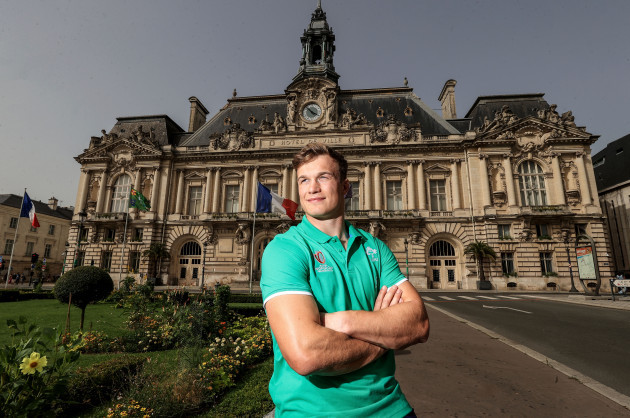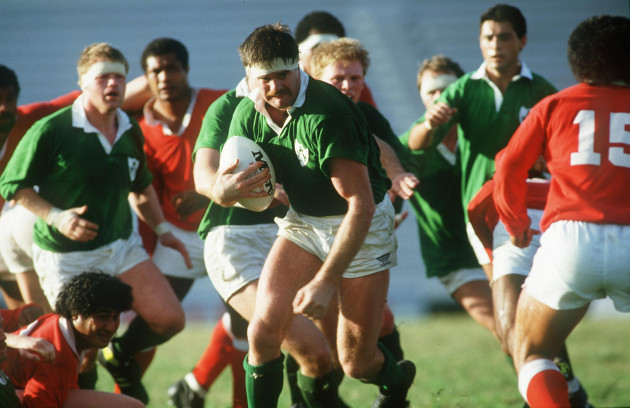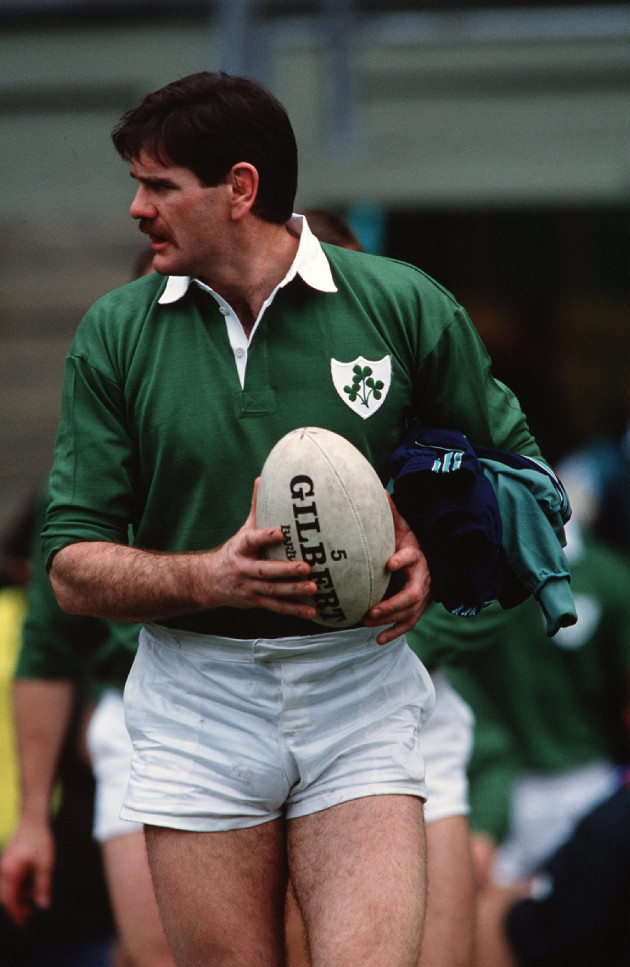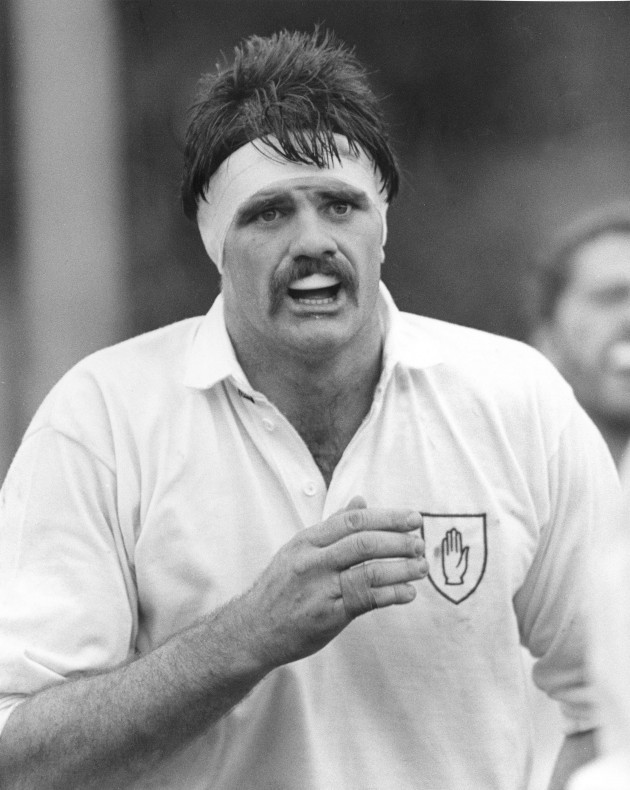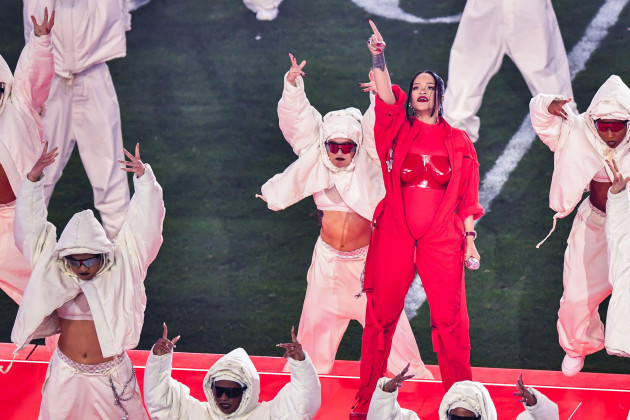THIS WEEK, THE Irish Rugby team conducted a press event in the Hôtel de Ville de Tours, the town hall of the charming Loire Valley town of Tours, where they have based themselves ahead of their opening fixture against Romania in Bordeaux.
When they train, it is at La Chambrerie in a redeveloped facility only opened this year. The planning for the next month has been years in the making.
Their flight over was one of luxury. Those who wanted them could wear compression socks before they boarded a plane emblazoned with imagery of Johnny Sexton and Conor Murray, at a time when newspaper articles are, without any trace of irony, posing the question, ‘Is rugby now the most popular sport in Ireland?’
Look, we all know the answer to that. But right now, the stock of rugby is brimming over and in a nation of event junkies, there will be an incredible and deserved level of interest and support for this Ireland team.
Broadcasting rights have required huge financial muscle. Newspapers have long sent out their 24 or 36 or whatever-you’re-having-yourself-page supplements and a million noughts and ones have died in the making of dozens of Podcasts opining on the chances of Ireland, well, you know. Getting to a semi-final? Winning the thing?
Hosting the World Cup is estimated as bringing an economic impact of £3 billion to the French economy. And by God, could they not use some bread and circus over there.
Now.
Let’s go back into the midst of time. To 1987 and the very first Rugby World Cup.
In the pages of the Irish Independent, the first match report was by Sean Diffley and it didn’t amount to a third of a page. Further up the food chain, ie closer to the back page, was an item on Stephen Roche’s progress in the Tour of Italy, English cricket at Edgbaston, greyhound results, and two pages of horse racing odds and results.
Not sexy. Not slick. It was brand new but unexciting.
And the IRFU weren’t so much holding it at arm’s length, but moreso on the end of a long stick with their head turned away. They would still accept the hospitality, of course.
Willie Anderson was too old to get caught up in any frivolity. Nor was he young and supple enough to emerge from the 36-hour flight to New Zealand in cattle class with his spine springing back into position.
The first of his 27 caps didn’t come until he was 29, and the Ulster Lock embraced everything about playing for Ireland which, let’s be honest, was quite the jump for an Orangeman’s son from Sixmilecross in west Tyrone. His spirit of adventure though, was not matched by the IRFU.
He answers the door of his house at the Loup, Co Derry, and with his shorts on, your eyes are drawn to the inches of thick scar tissue and bloated swelling around his knees. Both have been replaced. One of them is to be done again. Perhaps the other too. Either way you wince in pain for him for the next two hours. Heather, his rock, the source of his strength, is at her work, teaching. He makes the coffee and has all the time in the world to talk.
“The unfortunate thing was that Ireland didn’t want to embrace the World Cup. They were hesitant, The IRFU,” he explains.
Perhaps it was all too new-fangled for them. The runaway train of professionalism could be heard on the tracks coming from miles away, with serious momentum. The mandarins were cautious.
In the lead-in, Ireland had an odd Five Nations campaign. It started by walloping the English Sassenach, 17-0 in Dublin and finished with a ballsy win away from home to Wales. In between there were narrow losses to Scotland and France. But they had the Indian Sign over Wales and would be meeting them in the first game.
But then the IRFU decided against any warm up games or training camps.
“Instead of us building on what we did – and what we did was fantastic, moving on from where we were,” says Anderson.
“We had beaten Wales in the last match and we were playing them in the World Cup. It was almost like we were training on our own and we didn’t play any warm up games for the next seven weeks. We didn’t get prepared for it.
“The difference is black and white, compared to now.”
In between the two competitions however, came a devastating act. On 25 April, an IRA car bomb caught Lord Justice Maurice Gibson and his wife Lady Cecily as they were returning across the border after a break and a crossing that morning on the Liverpool ferry.
Going the other direction at the time, on their way to an Ireland training session were the then-British and Irish Lion, Nigel Carr, David Irwin and Philip Rainey. The car was loaded with 500 lbs of explosives and blew the vehicle asunder. Nigel Carr never played rugby again.
“That had a massive detrimental effect on the whole team. Losing Nigel, well he was such an instrumental player. One of the players of the tournament that year in the Five Nations,” says Anderson.
The team had been a tight-knit group, bonded by their Triple Crown in 1985 and with a healthy fascination for the differences and similarities between those north and south of the border. As much as both sides engaged with the debate and broadened their understanding, the car-bombing left the squad shocked and appalled and became the backdrop to their limited preparations.
And then, well, it’s hard to believe now, but it involved head coach Mick Doyle and perhaps it’s better that Anderson relates the day they arrived in New Zealand.
“The thing that I remember vividly was we travelled for 36 hours on flights.
“I got up and I could hardly walk. Guys were in pieces. And then we were straight out to training.
“We had landed and went out to train. Mick went with the backs and Syd Millar took us with the forwards, doing our lineouts and whatever else.
“Doyler was running after the back line and at one stage I was looking at him and his face was like Chernobyl!
“Like, the amount of Baileys that was consumed on the way over… the craic was mighty and all that, and then later on that evening we heard that he had a heart attack.
“So then Syd was in charge. Donal (Lenihan) was captain. We were sort of left to our own devices coming into the first game. But it was a bit like Delaney’s Donkey; huffin’it and puffin’ it and shushin’ it.”
The gregarious Doyle had a loose plan to do some training himself but at the opening dinner, a formal occasion to welcome all the teams that could make it, he suffered a heart attack. While he was able to recover sufficiently to act as coach for the tournament games, he had long lost a deep belief of his players in him and his methods during the hangover that followed the Triple Crown in ’85.
Anderson was used to a set-up with Ulster that led to them dominating the Interprovincial Championship throughout the ’80s and into the ’90s. The World Cup quickly became a classic case of playing staff being treated like pieces of meat.
“The hotel, I had to lie on the floor at night, the beds were that shocking. I had a bad back for a week. I had to recover, literally, from the flight. And we were being trained into the ground,” recalls Anderson.
The first game was against Wales, in Wellington. Ireland should have been going into it buoyant since they had signed off on their Five Nations Championship with a win over the Welsh.
Instead, the air had been gently squeezed out of the balloon ever since. The failure of Doyle and the IRFU to arrange warm up matches, the bombing that robbed them of three Ulster players and the insane travel and training arrangements was topped by Doyle’s misfortune.
Prior to the game, Wales players could belt out ‘Land Of My Fathers’ to stir the blood. The IRFU were in a bind with what song they could use as an anthem due to their own rulings. Eventually they settled on the insipid choice of ‘The Rose Of Tralee.’ Players looked up and down the line at each other, mortified.
Wales made use of the infamous ‘Wellington Wind’ and opted to play against it for the opening half, reckoning Ireland would take a while to get into their rhythm. Turns out nobody in the Ireland camp had knowledge of this peculiarity. They lost 13-6. The first day wasn’t even over and yet they knew they were sunk.
In truth, it was a shitshow from top to bottom.
Willie sets the whole adventure into context in a freeflowing stream of consciousness.
“Nowadays, the thing is completely different. Players go into a match and they are comfortable and relaxed and peaking.
“There were other sides in the same sort of disarray, but we were probably bottom of the heap.
“Everything was geared for New Zealand, in New Zealand. The opening ceremony was in Auckland, and we were there in Auckland. So we went along to represent our country, we got our World Cup cap and all, which was fantastic.
“It was historic, but you weren’t made feel that it was historic by the IRFU. We were on the cusp of professionalism. They weren’t sure about it but they knew the floodgates were going to open up at some stage.
“It took another eight, nine years for professionalism to come in and even then, it was semi-professionalism for a while.
“And today, the World Cup is a phenomena. It’s the world stage. France is going mental already.
“It told me that we were pilgrims, we had to keep going west to keep seeing the sunshine.
“We were beaten by Wales, it put us on the hind tit. We were just mad to get out of New Zealand and see Australia.
“But when we got to Australia, people asked what we were doing, and we would say that we were playing the World Cup. And most people we met hadn’t heard much about it!
“Rugby wasn’t even part of sporting culture there. It barely caught the imagination. You had rugby league, cricket and Aussie Rules. It was somewhere well below all of that.
“It went on and we lost against Australia and that was it.
“It was a fantastic experience to be a part of. But it certainly wasn’t embraced by the IRFU. Wales and Scotland did well enough out of it and that was our sort of legacy out of it. Competing for a World Cup is a different ball game altogether. It’s totally different and a level playing field for all sides.”
It might have taken another eight years before Rugby Union declared itself open for professionalism, but as Anderson says before that, some sides were being paid that much with wads into their boots, they could barely get their feet into them.
“I knew it had to come. The sponsorships, the crowds, the way it was marketed.”
For some years afterwards, Rugby tripped along in the netherworld, clinging to some of the best bits of amateurism, the cans in the dressing room stuff that was set directly against best practise in the professional, humour-free world of sports science.
Anderson’s generation was the last to enjoy the Jolly Boys On Tour culture and emerge guilt-free, knowing they hadn’t short-changed punters or employers.
He was captain after his Ulster head coach, Jimmy Davidson, took over from Doyle after the ’87 World Cup. Team captaincy also doubled up as social diarist.
One early trip in Davidson’s managerial stint was to France. Shorn of some of his more recognised players and facing the Barbarians and France themselves, he leaned on Anderson to engender some camaraderie.
“A bunch of guys gathered together to go into the Colliseum to the lions,” as he recalls.
“Jimmy Davidson . . . My greatest friend, mentor, a fantastic coach. He asked me what I wanted to do.
“’I’ll tell you what, Jimmy. I need a room. And get the waiter to bring us 26 pints every half hour for the next four hours, that will suffice,’ I said.
“And he did that, so we started playing beer games, sing-songs and so on. You could see people’s personalities starting to come out of themselves.
“Someone asked after that time, ‘what are we going to do now?’ And at that stage we had Jimmy McCoy and John McDonald on the trip with us, RUC guys.
“We always went to Strings nightclub and were told to always come down whenever we wanted. We had no transport but McCoy flagged down a Garda car. We all piled in and piled in and piled in.
“There were five players in the back seat. Three in the boot. And three in the passenger seat, all getting out and spilling onto the street outside the nightclub.”
At another stage, they were living the high life in a night club when someone whispered into Anderson’s ear, “By the way, you are playing France in about ten hours.”
And you know what? They beat the French team, Serge Blanco and all.
Little marks of respect were being casually introduced as professionalism loomed, but the IRFU had a habit of good intentions and poor delivery.
On a tour of Canada, they were dressed in enormous, baggy shellsuits. All the way through airports, the team had a tradition of singing songs to relieve the tedium. One time a traveller asked them, “Are you guys a choir?” Another time, “Are you all astronauts?”
What kind of songs?
Nothing from the Viz-style adolescent oeuvre. They were folk songs and old airs. Willie’s signature was ‘Wild Mountain Thyme,’ his nod to the links of his people to Scotland.
On trips to Shannon from Ulster, it wasn’t uncommon for both teams to sit in a clubhouse and sing for two hours solid before cramming back into the bus and making for the long journey home.
With his province, he enjoyed unprecedented success. They simply gobbled up the Provincial title year after year. Even though the sport was amateur, Jimmy Davidson had high standards.
“Jimmy Davidson had a massive influence on us. Number one was that you wouldn’t be on the team unless you were flying fit,” Anderson explains.
“That made us so far ahead of everybody else. We were doing bleep tests, sprint tests, weight lifting. We were professional, before professionalism. We would have been preparing every day, whether it was with the team, or ourselves.
“That weeded out the guys who couldn’t hang on. The boulder had rolled down the hill and all the clay was flying off it. If you weren’t clinging tight enough to it, you would fly off.
“And here was another thing; anybody who played for that team, was from Ulster. It was an unbelievable generation of players but they were all Ulster men and they would have died for each other.”
Behind the scenes, they had their own unique way of bonding beyond false friendship.
Throughout the year, Davidson thought enough of each player that he would write them a series of letters, two sides of an A4 sheet about their performance, fitness and observations. These would then become the basis for regular one to one conversations.
Within the team, they established ‘Truth meetings’ long before that process mutated into the ubiquitous present day ‘No dickheads’ policy.
“That philosophy, it is a bit like the French Foreign Legion, where they were on a mission and would review it for what they did and didn’t do. Because you cannot go into war without knowing the guy beside you is going to do exactly what he needs to do at that particular time. If he doesn’t, you’re dead!.
“So we use that technique and it could have the potential to be brutal, but it never was brutal. It was cathartic. It was like using a Dyno-Rod, just clearing the whole system.”
Apart, maybe from one occasion.
In 1998, the former Armagh football joint-manager Brian Canavan asked Anderson in to meet with his senior panel. They attempted a truth meeting where the players had to say one harsh truth, and a compliment to another. In front of the whole room.
Martin Toye was a wily old campaigner and a loyal servant to Armagh. In front of him was Tony McEntee, barely out of his teens but already renowned for forthright views. Asked to make a criticism of Toye, McEntee looked him in the eye and bluntly stated, ‘No harm to you Martin, but you were finished as an inter-county player five years ago.’
It brought an end to the meeting. But Armagh were Ulster champions the following summer for the first time in 17 years.
Even now, Anderson is in demand to facilitate such meetings. On the day we meet, he was travelling to Clontibret to speak to their senior footballers, excited to meet Conor McManus.
His life is slower now, more contemplative. No more drink, not since his son Thomas wrote him a letter begging him to stop.
It became an issue, his way of coping, after he knocked down an 11-year-old boy, Glen McLernon, while driving home. He passed away from his injuries. The inquest showed that Anderson was blameless and could do nothing after the boy ran out onto the road.
A few weeks before, he had presented the same child with a signed rugby ball. He knew the family. He had to live with a terrible, dreadful guilt that sat in the floor of his gut. So he drank. Not in a sing-song come-all-ye fashion of old, but in a sinister, brooding way.
Thomas asked him to stop. And he did. He acknowledges now that had he not, he was going to lose everything, anyway.
Around that time, he began a family tradition of telling his children Thomas, Jonathan and Chloe, that he loved them. For the son of a B-Special, Orangeman in deepest west Tyrone, of that generation, this is hardly commonplace.
“People have questioned me on that. ‘You say that?’” he explains.
“And they say, ‘I couldn’t say that. But they would know.’ And I always say, ‘well, they mightn’t know.’
“I know it’s an old-fashioned thing that people didn’t say that. But Thomas says it to his kids, so it’s a legacy that we have in this house. Our kids won’t have to be asked to do it. It’s just part of their values. It’s a natural thing. It’s become a natural part of our family.”
All three children work in London. Thomas – after a spell earlier as a professional rugby player with Ulster – now works as a manager for Jonathan, better known as JW Anderson who has established himself as one of the very top clothes designers on the planet.
When Rihanna performed the half time show at the Superbowl last February, she was wearing a JW Anderson creation. When Beyonce thrusts and leaps around the stage in her shows, she’s wearing JW Anderson.
When LeBron James is slumming it in a hoodie, it’s by JW Anderson. At home outside the Loup, the walls are bare of anything relating to Willie’s rugby career but there is one small picture of the family after one of Jonathan’s shows. At the end of the row is Dan Levy, the actor who played David Rose in the global comedy, ‘Schitt’s Creek.’
Willie – a massive fan of the show – has his arm around him and both men are laughing hard. A yarn from Sixmilecross, perhaps.
When Jonathan was starting his journey, his parents mortgaged their house to fund his endeavours. As a child, teachers said he had an acute case of dyslexia. Heather taught him a way around it by using Spider Graphs to organise his thoughts.
He uses the very same methods now to design clothes.
“I don’t like saying things like this… He’s a genius. He sees things in no other way others can. Because of his ability and possibly his difference,” says his father.
“The drive that he has to say, ‘well, fuck yes. I’ll show ye. I might be dyslexic or whatever, but I am going to be the best.’”
Since the publication of his excellent autobiography, ‘Crossing The Line’, Anderson has been sought out and asked about his political beliefs. His spirit of co-operation has brought warmth from all sides, but no shortage of people wanting to throw the ‘Lundy’ label on him too.
He’s gone away from Orangeism. He enjoys singing in his local church. He knows his origins and he wouldn’t dismiss them either.
“It was all part of the process. No different than others going across the road to the GAA club. I would never disrespect where I was, and where I was brought up. I enjoyed my life and playing the pipes, going out to the Twelfth.
“But I didn’t go to the Twelfth to ‘kick the Pope.’ I went to the Twelfth for the craic.
“My father was very much respected in the whole community. If the cow falls over into a sheugh, or gets sick while calving, well then, it’s not a Catholic or a Protestant cow. It’s a cow. So you help that man.
“We were never brought up with a hatred.”
He continues, “If Ulster, Northern Ireland, the north of Ireland, whatever you want to call it, had integrated schools tomorrow, if everyone went to the same school as year dot, we wouldn’t be in the same problems as we have now.
“I would be playing Gaelic football, others would be playing rugby, and there would be no issue. And if you want to go to church on Sunday, work away.
“But, I am down the middle of the track. Diehards want different things. I may not be my lifetime but there will be a United Ireland at some stage. Our side of the story, we need to decide how we want to be going into ‘Ireland.’ I am not sure what way that will be.
“But it is coming. It’s coming down the tracks.”
And he tends to spot these things.

